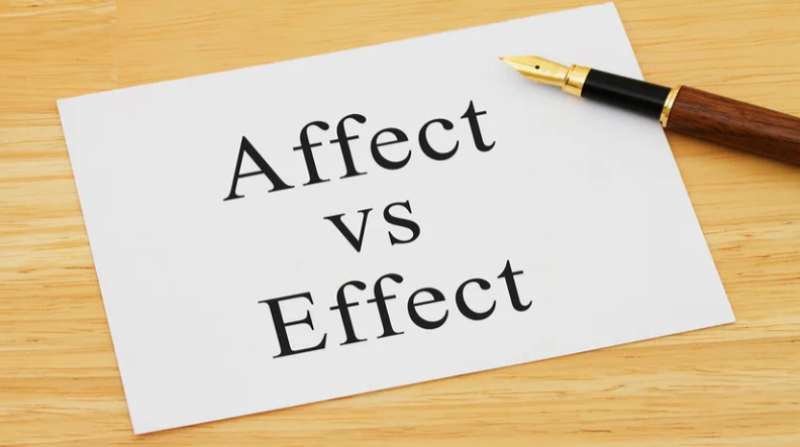Affect vs Effect : Unlocking the Language Puzzle
Contents

Picture this: you're at a social gathering, engaging in interesting conversations with new acquaintances. Suddenly, the topic of weather comes up, and someone mentions how the rain affects their mood. You want to contribute to the discussion but hesitate because you're unsure if they used "affect" correctly or if it should have been "effect." Sounds familiar, doesn't it?
The importance of understanding the distinction between affect and effect cannot be stressed enough. These two words may seem similar, but their meanings are distinct.
For English learners, mastering the correct usage of affect vs effect can be challenging due to several reasons. Firstly, both words can be pronounced similarly in some contexts, leading to confusion during conversations. Secondly, there are instances where affect can also be used as a noun in specialized fields such as psychology and medicine.
Now, let's dive deeper into the differences between affect and effect. But before we do that, here's a question for you: Can you think of any scenarios where using affect instead of effect or vice versa would completely change the meaning of a sentence?
Think about it while we explore this topic together!
Understanding the Meanings of Affect and Effect
When it comes to the English language, certain words can be quite tricky to grasp. Two such words that often cause confusion are "affect" and "effect". To help you unravel this language puzzle, let's break down affect vs effect meanings and explore how they are used in different contexts.
1) Affect
"Affect" is primarily used as a verb to describe the influence or impact something has on someone or something else. Here are a few examples that showcase different contexts in which "affect" is used:
The rainy weather affected my mood, making me feel gloomy all day.
Poor time management can affect your productivity at work.
His kind words affected her deeply, brightening her day.
2) Effect
"Effect" can be used both as a noun and a verb, adding another layer of complexity to its meaning.
Noun: As a noun, "effect" refers to the result or consequence of an action. Here are some examples:
The effect of regular exercise on your health is immense.
The new government policies had a positive effect on the economy.
Music has a calming effect on my mind.
Verb: As a verb, "effect" means to bring about or accomplish something. Take a look at these examples:
He wanted to effect change within his community by starting an education program.
The CEO's decision will effectively restructure the entire organization.
The teacher's dedication effectively motivated her students to perform well.
By understanding the distinctions between "affect" and "effect," you can use them accurately in your communication. Remember that "affect" is usually used as a verb, describing influence or impact, while "effect" can be used as both a noun and a verb, referring to the result or accomplishment.
Differentiating Affect vs Effect Pronunciation
Do you struggle with the pronunciation of "affect" and "effect"? In this section, we will focus on the latter - the pronunciation differences between "affect" and "effect". Let's dive in!
To help you understand the nuances of their affect vs effect pronunciation, let's compare them side by side with the help of their phonetic spellings and audio samples:
Word | Phonetic Transcription | Sounds Like | Audio Sample |
Affect | /əˈfɛkt/ | uh-fekt | [audio] |
Effect | /ɪˈfɛkt/ | ih-fekt | [audio] |
In the table above, you can see that both words have a similar vowel sound represented by the letter 'e'. The key difference lies in the first syllable: 'uh' for "affect" and 'ih' for "effect". Paying attention to these subtle differences will help you pronounce them correctly.
To further illustrate how to pronounce these words, let's break them down.
1. Affect (/əˈfɛkt/):
- The first syllable sounds like the schwa sound ('uh'), which is a neutral vowel sound.
- The second syllable rhymes with 'bet' or 'met', pronounced as /fɛkt/.
- Think of it as saying "uh" followed by "fect", but blending them together quickly.
2. Effect (/ɪˈfɛkt/):
- The first syllable sounds like the short 'i' sound ('ih'), as in 'sit'.
- The second syllable rhymes with 'bet' or 'met', pronounced as /fɛkt/.
- Imagine saying "ih" followed by "fect", but smoothly connecting the two sounds.
Remember, practice makes perfect! To further solidify your understanding, here are a few sentences to help you differentiate the pronunciation of "affect" and "effect":
1. The storm affected (pronounced /əˈfɛktɪd/) my mood.
2. The medication had an effect (pronounced /ɪˈfɛkt/) on his energy levels.
Understanding the pronunciation differences between "affect" and "effect" is vital for effective communication in English. By referring to the table and paying attention to the specific sounds in each word, you'll be able to confidently use them in conversation. Keep practising, and soon enough, their pronunciation will become second nature to you!

Common Mistakes Learners Make
As you delve into the intricacies of the English language, it's natural to come upon certain stumbling blocks. "Affect" and "effect" are two words that often confuse learners, but fear not! We're here to shed light on these language puzzlers and help you navigate them with ease.
To begin with, let's address some common mistakes learners make when using affect and effect. Here are a few incorrect affect vs effect examples:
The rain had a positive affect on my mood.
His absence had a huge affect on the team's performance.
The new policy will not effect our daily operations.
Now, let's correct these sentences to demonstrate the proper use of affect and effect:
The rain had a positive effect on my mood.
His absence had a huge effect on the team's performance.
The new policy will not affect our daily operations.
By understanding the subtle differences between affect and effect, you can avoid these common errors and communicate more effectively in English.
Remember, affect is usually used as a verb meaning "to influence or produce a change," while effect is typically used as a noun meaning "the result or outcome of something." Keep this simple rule in mind, and you'll be well on your way to mastering these language puzzle pieces.
For further clarification on the affect vs effect meaning, here are some helpful resources:
Watch this video from Clapingo explaining the difference:
Now that we've cleared up some common misconceptions, let's move on to other fascinating aspects of English language learning. Stay tuned for more insights and tips to enhance your language skills!
Translations and Interpretations in Indian Languages
Have you ever wondered how the words "affect" and "effect" are translated or interpreted in different Indian languages? Language is a fascinating puzzle, and unlocking it can open up a world of understanding. Let's take a look at some translations in popular Indian languages:
Here is a table showcasing translations of "affect" and "effect" in some Indian languages:
Language | Affect | Effect |
Hindi | प्रभाव (prabhav) | परिणाम (parinaam) |
Bengali | প্রভাবিত করা (probhabito kora) | প্রভাব (probhab) |
Telugu | ప్రభావితం చేయు (prabhavitham cheyu) | ప్రభావం (prabhavam) |
Marathi | प्रभावित करा (prabhavit kara) | परिणाम (parinam) |
Gujarati | અસર થવો (asar thavo) | પ્રભાવ (prabhav) |
Malayalam | പ്രഭാവം ഉണ്ടാക്കുക (prabhavam uṇṭākkuka) | ഫലം (phalam) |
Assamese | প্ৰভাবিত কৰক (probhabit korok) | ফলাফল (phalaphal) |
Urdu | اثر انداز (asr andaaz) | تاثیر (taasir) |
As you can see, the translations vary slightly in each language, but they all capture the essence of "affect" and "effect". These translations will help you understand the meaning and usage of these words in your native language.
Understanding the difference between "affect" and "effect" is crucial for effective communication in English. By learning these translations, you can enhance your language skills and avoid confusion.
Remember, learning a new language is not just about grammar and vocabulary; it's also about understanding cultural nuances and expressions. So, whether you're learning English or any other language, embrace the joy of language learning, one translation at a time!
Final Thoughts
You have successfully navigated through the intricate world of affect vs effect. Throughout this article, we have covered key points that will undoubtedly help you master these confusing words and unlock the language puzzle.
Remember, "affect" is typically used as a verb and refers to the influence or impact something has on someone or something else. On the other hand, "effect" is commonly used as a noun and represents the result or consequence of an action. "Affect" sounds like "uh-fekt," while "effect" sounds like "ih-fekt".
Understanding the distinction between affect vs effect is crucial for effective communication. Misusing these words can lead to confusion and sometimes even alter the intended meaning of your message. By mastering their correct usage, you can enhance your spoken English skills and convey your thoughts accurately.
To further assist you in your language learning journey, check out Clapingo - an exceptional online platform dedicated to helping Indian learners develop their English speaking and writing skills. With a focus on spoken English development, Clapingo offers a wide range of resources tailored to your specific needs.
Whether you are a young student or a business seeking to train its employees, Clapingo has got you covered. Their experienced tutors will guide you through practical exercises and provide valuable feedback to improve your pronunciation, fluency, and overall language proficiency.
With dedication and practice, you will conquer any language challenge that comes your way!
FAQs
1. What does affect vs effect mean?
"Affect" is a verb that means to influence or produce a change in something or someone. On the other hand, "effect" is usually a noun that represents the result or consequence of an action. For example, "The rain affected my mood" or "The effect of the rain was noticeable on my mood."
2. How to use effect vs affect?
To use affect correctly, remember that it is usually used as a verb and is followed by an object. For instance, "Her speech affected the audience deeply." On the other hand, effect is generally used as a noun and doesn't require an object after it. For example, "The new policy had a positive effect on productivity."
3. How do you remember effect vs affect?
Remembering the difference between affect and effect can be challenging, but here's a helpful tip! Think of "affect" with an "a" as an action word, influencing something or someone. Conversely, think of "effect" with an "e" as an end result or consequence.
4. Will it affect me or effect me?
In most cases, you would use "affect" instead of "effect" when referring to how something influences or impacts you personally. For example, "Will this decision positively affect me?" However, if you are referring to bringing about a change in yourself as a result of something external, you can use "effect." For instance, "I will effect changes in my life starting today."
5. Can you use affect and effect in a sentence?
Here are examples of "affect" and "effect" used in the same sentences:
The manager carefully considered how the changes would affect the team members and anticipated a positive effect on their job satisfaction.
The unexpected market downturn had a significant effect on the project's timeline, ultimately affecting the team's morale.
- Are you affected or effected by Covid?
The correct term to use in this context is "affected." The correct form is "Are you affected by Covid?"
6. What are some examples of affect and effect?
Here are some examples of affect and effect:
Affect:
The news affected her deeply.
The music affected my mood positively.
Effect:
The new policy had a positive effect on the company's sales.
The lack of sleep can have a negative effect on your health.
You may want to read
30 English Movies To Learn English: Know How The Language Works
Comments
Your comment has been submitted